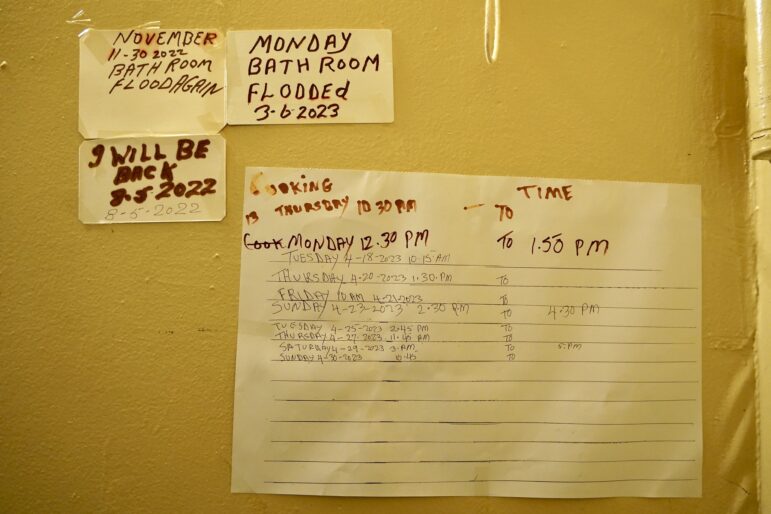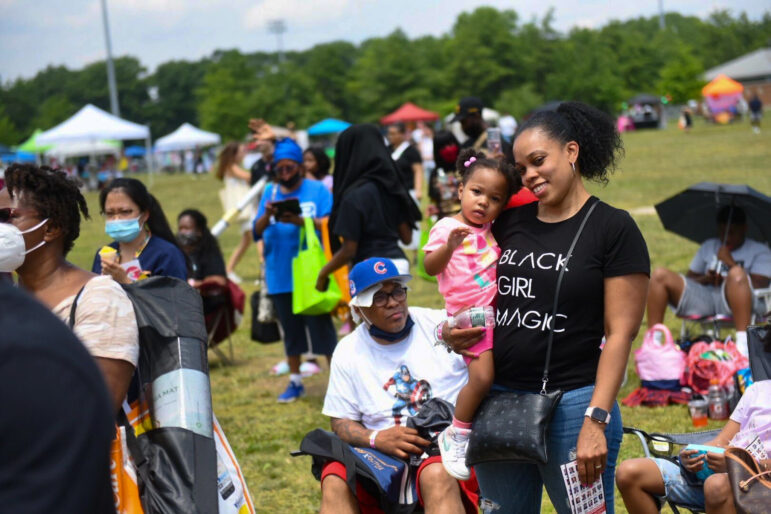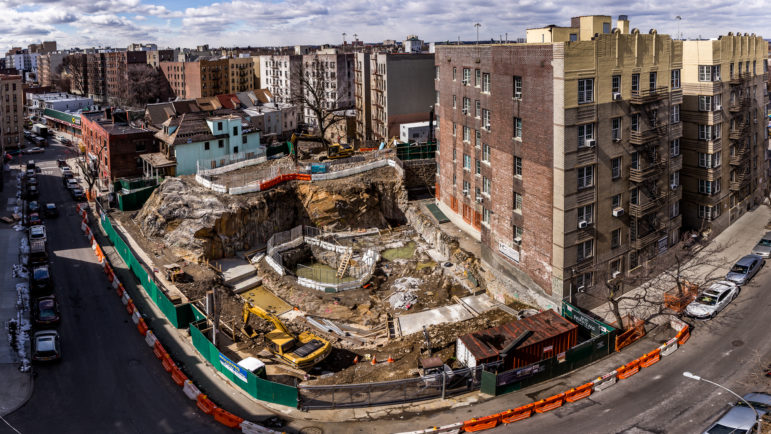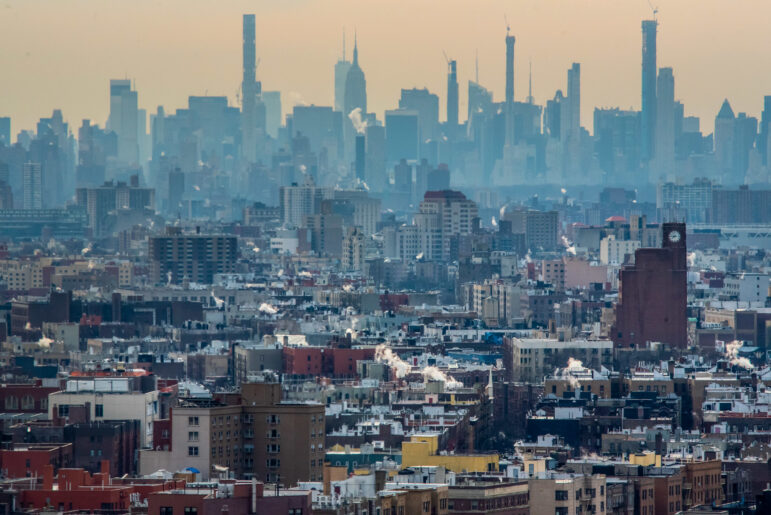“It doesn’t mean that they can’t be challenged again, they probably will be, but for the moment these significant challenges to rent laws are done,” said Thomas Silverstein of the Lawyers’ Committee for Civil Rights Under Law.
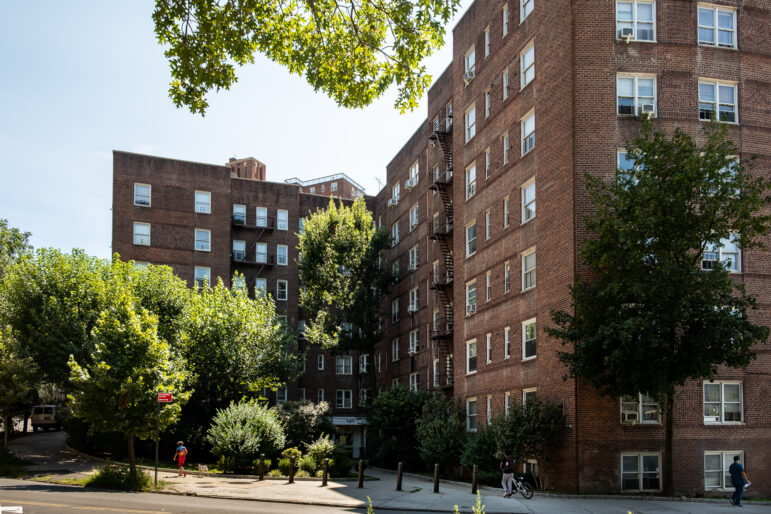
Adi Talwar
A rent-regulated building in The Bronx in 2023.The U.S. Supreme Court on Tuesday said it will not take up two lingering challenges to rent stabilization from New York City landlords, ending months of uncertainty after a broad challenge to the regime got tossed out at the beginning of October.
But hinting at interest in future challenges, Justice Clarence Thomas issued a brief statement Tuesday accompanying the court’s denial notice. “The constitutionality of regimes like New York City’s is an important and pressing question,” he wrote.
Tenant and landlord groups alike had waited anxiously to see if the justices would decide to hear arguments on either remaining case. Both lawsuits attacked the Rent Stabilization Law (RSL) on narrower grounds than the Community Housing Improvement Program (CHIP) and Rent Stabilization Association (RSA) had.
“It doesn’t mean that they can’t be challenged again, they probably will be, but for the moment these significant challenges to rent laws are done. They’re over,” said Thomas Silverstein of the Lawyers’ Committee for Civil Rights Under Law, who has been tracking the cases.
Passed by the New York City Council in 1969, the RSL set the groundwork for rent stabilization at a time when housing costs were rising dramatically. Enforced at the state level through the Rent Stabilization Code, the protections apply to buildings constructed before 1974 with more than six units, as well as newer properties with state tax breaks.
Tenants across nearly 1 million rent stabilized apartments in New York City benefit from the right to a lease renewal, and limited annual rent adjustments.
Tenant advocates see this housing stock as a precious resource, at a time when New York City’s homeless population is booming and the number of apartments affordable for low- and middle-income tenants is at a historical low.
The lawsuits tossed Tuesday were brought by two groups of New York City landlords, led by 74 Pinehurst LLC and 335-7 LLC respectively. Both included “as-applied” arguments, meaning they alleged the RSL is unconstitutional as it applies to their specific circumstances.
Attorneys for these parties did not immediately reply to requests for comment Tuesday. Two other rent stabilization challenges are awaiting decisions on appeal but could eventually make similar requests to the Supreme Court—called petitions for a writ of certiorari, or cert petitions.
Gov. Kathy Hochul, a defendant in the cases, said in a statement that she was “relieved” by Tuesday’s outcome, calling the rent stabilization laws “some of our state’s most powerful tools” to fight inequality and maintain affordable housing.*
The Pinehurst group included Dimos and Vasiliki Panagoulias and their son Dino, a family that owns a 10-unit building in Long Island City, Queens, and several LLCs that own one building each in Manhattan. They all took issue with how the RSL limits landlords’ ability to remove tenants when their leases expire.
According to their petition, the Panagoulias family couldn’t move their daughter Maria into one of their apartments.
The other landlords in the group claimed that they couldn’t take back any units for this purpose either, because they own their buildings through LLCs. The suit also argued that successorship rights under the RSL—tenants can pass their leases onto family members if certain conditions are met—allowed for tenancies to continue “perpetually.”
In February 2023, a panel of judges with the U.S. Court of Appeals for the Second Circuit found that the Pinehurst lawsuit had failed. In their decision, they said that the RSL didn’t amount to an unconstitutional taking because the landlords had decided to welcome tenants into their buildings and could still evict those who violated their leases.
The other lawsuit, brought by landlords including 335-7 LLC, alleged that the RSL had “dramatically reduced the economic value” of their properties. This group owns buildings in the South Bronx, East Harlem and lower Manhattan, and also took issue with the long-term tenancy rights under the RSL.
Like the Pinehurst landlords, they argued that the state’s 2019 Housing Stability and Tenant Protection Act (HSTPA) made their prospects worse. That law narrowed landlords’ ability to increase rent between tenancies and deregulate apartments.
“As recently amended, the RSL makes New York’s once ‘temporary’ rent stabilization regime permanent for over one million apartments,” the 335-7 LLC group argued in court filings.
In his statement Tuesday, Justice Thomas said that the Pinehurst and 335-7 LLC cases included “generalized allegations” and were not good vehicles to consider “how New York City regulations coordinate to completely bar landlords from evicting tenants.”
“However, in an appropriate future case, we should grant certiorari to address this important question,” he continued.
Sherwin Belkin, a partner with Belkin Burden Goldman LLP who represents landlords, said Tuesday that he expects landlords to challenge the HSTPA, more narrowly.
“I assume at some point in the future there will be a more specifically-brought case, perhaps rather than challenging all of the HSTPA, challenging specific portions of it,” he said.
It is unfortunate that Justice Thomas appears to be inviting more lawsuits, said Ed Josephson of the Legal Aid Society, co-counsel for tenant groups who joined the cases. But he was largely relieved to see the cases tossed, reacting with a “Hallelujah!”
“The fact that Justice Thomas made his own statement just shows that the majority did the right thing,” he said. If more lawsuits emerge, he added, “I think they will have the same result.” Legal Aid has argued that the RSL does not establish permanent tenancies, as there are still avenues to remove tenants.
In the meantime, some critics of rent stabilization have turned their attention to the state legislature. Jay Martin, executive director of CHIP, said he was not surprised by today’s outcome. His group is lobbying for legislation that would allow for rent increases to upgrade vacant stabilized apartments after a tenancy of at least 10 years.
“This just furthers the need for legislative amendments to work with property owners to frame a resolution, to make sure that we are properly able to run these buildings,” he said.
To reach the reporter behind this story, contact Emma@citylimits.org. To reach the editor, contact Jeanmarie@citylimits.org
*This story has been updated with comment from Gov. Hochul and context on pending challenges to New York’s rent laws.


